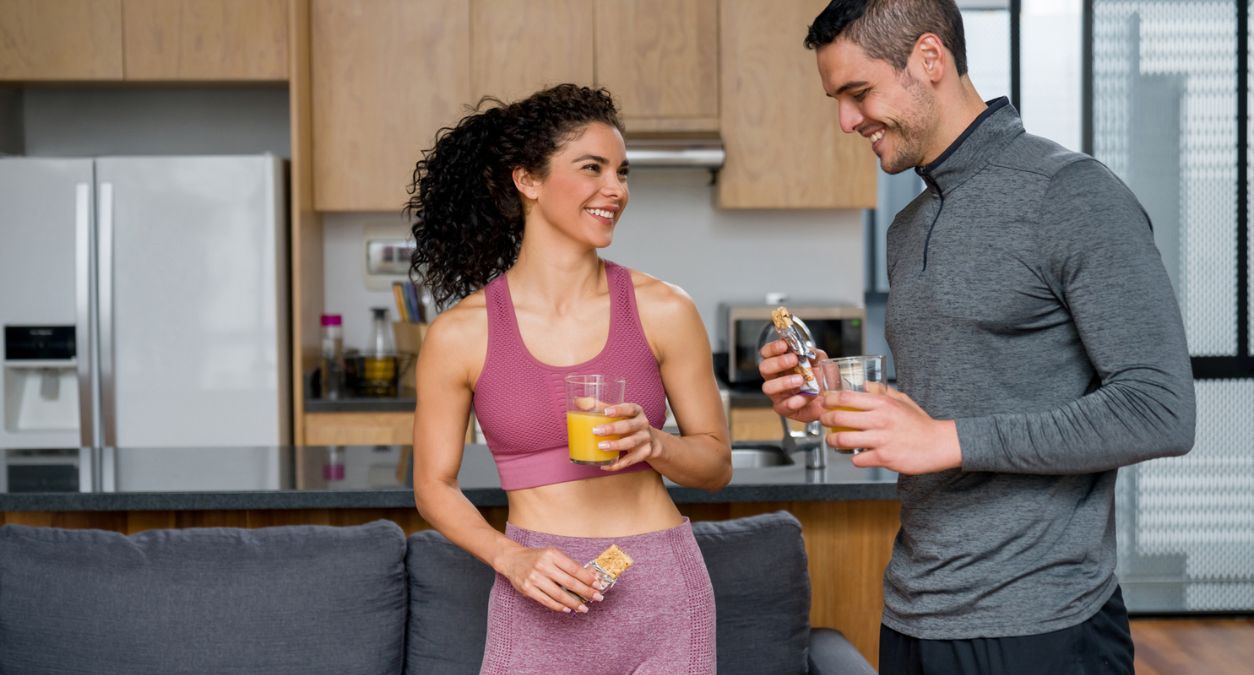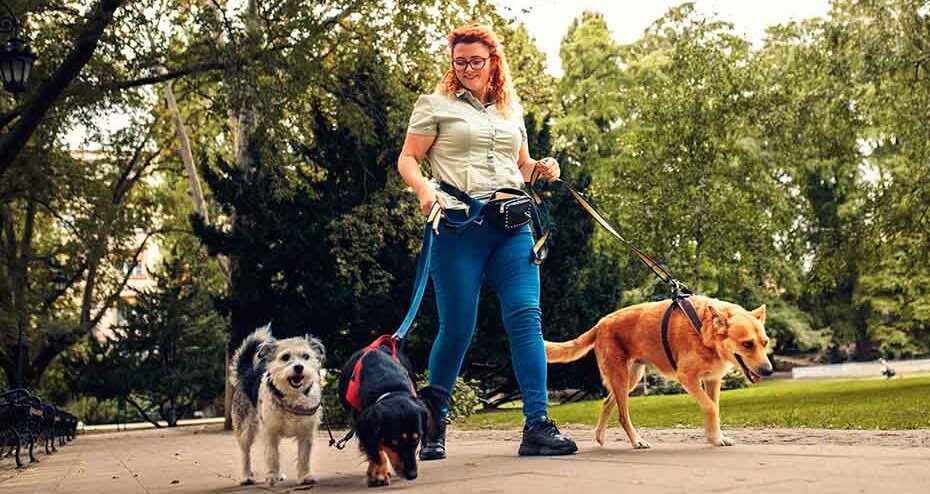Table of contents
If you’re anything like me, working out makes you hungry (I can’t be the only one who raids the kitchen cupboard after lifting weights for an hour, surely?). The trick is having a great snack prepared beforehand, so that you’re not tempted to hit the Drive Thru on the way back from the gym. It also means you have a chance to pack in the extra protein, vitamins and needed for muscle recovery.
Below are 5 pre and post workout snacks, which will help with this. We’ll also look at some of the misconceptions surrounding these foods.
Protein Pancakes – for when you’ve exercised before breakfast
A personal trainer taught me this simple trick to making pancakes without using sugar or flour. To make two pancakes, you’ll need just 1 Banana & 2 eggs. Yes, really.
Simply pop the banana into your blender, crack open two eggs and whizz them together to make the pancake batter. Pro tip: if you fancy a chocolate fix, you could add 2 teaspoons of powdered cacao at this stage.
Pre-heat a small frying pan and spray with coconut oil. Next, on a low-medium heat, pour in half of the batter mixture and wait before flipping over. Don’t be tempted to flip the pancake too soon – it will go all over you! Instead let it ‘firm up’ a bit, to the point where it isn’t runny on the top and can be easily flipped over using a plastic turner, without dripping all over the place.
Once cooked, do the same with the rest of the mixture and then stack them up! You could also top them with a spoon of Greek Yogurt and a handful of your favourite fresh fruit.
Myth to debunk: Eggs & Cholesterol
A lot of people still think eggs are to be avoided because of the cholesterol content found within the yolk. However the Department of Health and organizations such as Heart UK and the British Heart Foundation have all changed their advice regarding eggs as result of recent research.
We now know that dietary cholesterol, such as that found in eggs, has a much smaller effect on blood levels of total cholesterol and harmful LDL cholesterol, especially when compared to saturated fat, which is found in foods such as butter and fatty meat. Eggs however, are low in saturated fat, high in protein and rich in 18 different vitamins and minerals.
Quark Chocolate Mousse – for when you need chocolate waiting for you on the other side of your workout (we’ve all been there!)
To make 3-4 desserts, you’ll need a 250g tub of Quark (a high protein cream cheese which tastes like plain yogurt) and 100g of dark chocolate. For added flavour you could also add in a teaspoon of peppermint oil or orange extract.
Simply place a glass bowl into a saucepan filled with water and place over a low-medium heat. Break up the chocolate and melt this in the bowl. Once melted, remove the bowl from the saucepan, stir in the Quark and add in the peppermint oil or orange extract if you wish. Next, pour the mixture into 3 or 4 separate containers (I’ve reused some glass dessert pots), cover with foil and place in the fridge to cool and set for at least 30 minutes.
Myth to Debunk: “I can’t eat chocolate I’m on a diet”
The problem with this logic, comes down to human nature. The more you deny yourself something, the more you’ll want it. It’s like if I tell you not to think about a pink elephant, and then ask you what you’re thinking about right now (a pink elephant, right?).
So instead of denying yourself chocolate if it’s something you really want, eat it in a way that satisfies your craving for chocolate but doesn’t overload you with sugar.
Many people find dark chocolate to be very rich and so they’re less likely to eat too much of it. Adding a few squares of high quality dark chocolate (70% or more) to quark is a fantastic way to take the bitterness away from the dark chocolate, while still benefiting from its antioxidant properties and satisfying your chocolate cravings all in one go.
Homemade Coconut Granola Bar – for when you need a carb fix before going for a long run
This is a great one to batch at the weekend and portion out for the next week or two.
To make a tray of granola, which you can cut into 16 individual bars, you will need 180g of rolled oats, 30g dried fruit, and 30g of chopped nuts, 130g desiccated coconut, 8 tablespoons of your favourite high protein nut butter (P2B or almond butter are my favourites), 5 tablespoons of honey and 60g unsalted butter.
In a saucepan, melt the butter, honey and nut butter on a low heat and stir until it melts and mixes together. Pour in the oats, nuts and fruit and mix well. Next, add in the coconut and mix well again. Pour out onto a medium-sized foil-lined tray and flatten out the mixture with a wooden spoon to cover all the tray. Place into the fridge for an hour (or the freezer for 30 mins) and then cut 16 squares.
Myth to debunk: Carbs are bad for you
Carbs are an essential part of our diet but have developed a bad reputation over the years, despite being your body’s main source of energy. Aim to consume around 40% of your daily calories from carbohydrate sources. Too few carbohydrates can make you feel weak, lethargic and unable to focus on even simple tasks.
If you have an endurance based workout planned for the day, you may find it beneficial to have a carb heavy meal beforehand for energy, and then focus on fats and proteins afterwards to aid with recovery and muscle repair.
Frozen Grapes – for when you need to replenish electrolytes after HIIT
I never thought of freezing grapes before, until a fitness instructor told me it was her favourite refreshing snack for rehydrating in between hour long classes. They taste like little bites of sorbet and all you need to do, is place them in the freezer overnight!
Myth to debunk: You need a sports drinks to replenish electrolytes
The idea of a sports drink is to replace the electrolytes lost through intense training sessions. Electrolytes are minerals found in the body which can be obtained from food and drink, which conduct electricity i.e. send messages all around the body, and are vital for the functioning of our organs and cells. You can lose electrolytes through excessive sweating, urination, diarrhoea and vomiting, resulting in an imbalance. An electrolyte imbalance can affect your nervous system, heartbeat, kidney functioning, muscle functioning and the balance of fluid in the body. In extreme cases, it can be fatal.
For most people, after a workout session or around 60 minutes a simple bottle of water and a post-workout snack of grapes or a banana will work perfectly fine to replace any electrolytes lost and there’s no need for a sports drink. Besides, many sports drinks on the high street are full of sugar, artificial colours and sweeteners, so they’re best avoided.
Banana Ice Cream – For when you want to prevent muscle cramps
This is ridiculously easy to make and makes a great pre-workout snack, as all you need to do is place a banana in the blender, blend until smooth and then freeze in an airtight container for over an hour.
If you want to make it a little fancier, try topping it with chopped almonds and a dash of Choc Shot. Cool, tasty and full of potassium!
Don’t have time to make ice cream? Simply pop a banana in your gym bag, it even comes in its own biodegradable wrapper, making it the perfect snack for on-the-go.
Myth to debunk: “Too many bananas will kill you”
There’s two misconceptions underpinning this myth, one is concerning radiation, and the other is overdosing on potassium.
With regards to radiation, it’s true that bananas contain a small number of radioactive isotopes. According to the BBC, a typical banana contains 0.1 microsieverts of radiation. To put that in context, a typical CT scan in a hospital exposes humans to between 10 and 15 millisieverts, so about 100,000 times more than your humble banana. The levels of radioactivity are therefore negligible.
It’s also feared that eating too many bananas will result in an overdose of potassium, which can cause stomach pain, and irregular heartbeat, diarrhoea and vomiting. Adults should consume about 3,500mg of potassium per day, according to the NHS. The average banana contains about 450mg of potassium, so a healthy person with normal-functioning kidneys, could consume at least seven-and-half bananas in a day before reaching the recommended daily amount.
*Disclaimer – This blog has been created as general information and should not be taken as advice. Make sure you have the correct level of insurance for your requirements and always review policy documentation. Information is factually accurate at the time of publishing but may have become out of date.
Last updated by

















